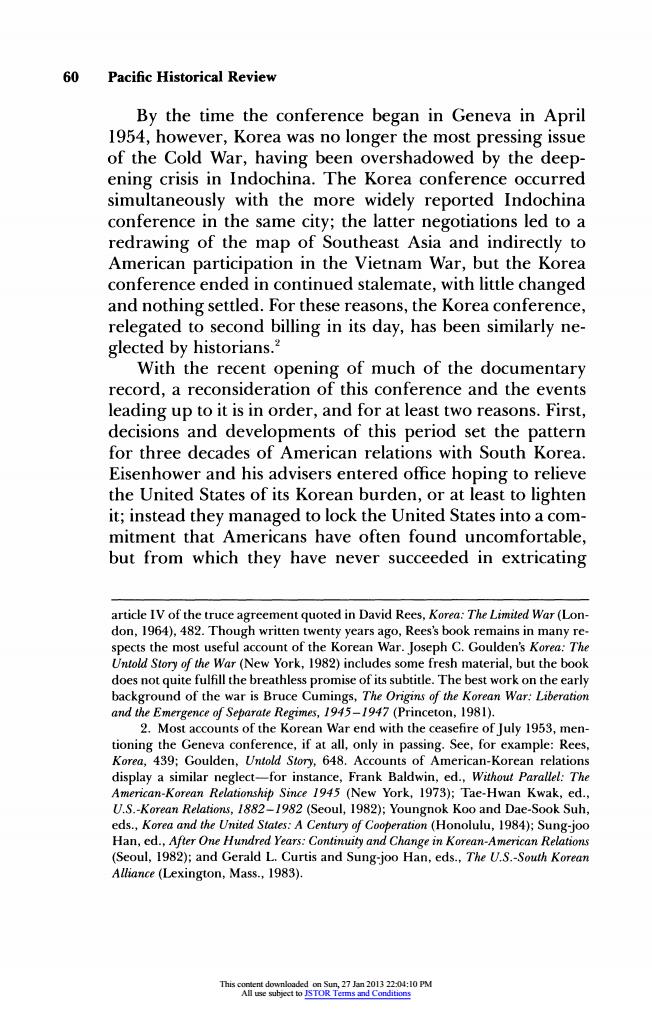正在加载图片...

60 Pacific Historical Review By the time the conference began in Geneva in April 1954,however,Korea was no longer the most pressing issue of the Cold War,having been overshadowed by the deep- ening crisis in Indochina.The Korea conference occurred simultaneously with the more widely reported Indochina conference in the same city;the latter negotiations led to a redrawing of the map of Southeast Asia and indirectly to American participation in the Vietnam War,but the Korea conference ended in continued stalemate,with little changed and nothing settled.For these reasons,the Korea conference, relegated to second billing in its day,has been similarly ne- glected by historians.? With the recent opening of much of the documentary record,a reconsideration of this conference and the events leading up to it is in order,and for at least two reasons.First, decisions and developments of this period set the pattern for three decades of American relations with South Korea. Eisenhower and his advisers entered office hoping to relieve the United States of its Korean burden,or at least to lighten it;instead they managed to lock the United States into a com- mitment that Americans have often found uncomfortable, but from which they have never succeeded in extricating article IV of the truce agreement quoted in David Rees,Korea:The Limited War(Lon- don,1964),482.Though written twenty years ago,Rees's book remains in many re- spects the most useful account of the Korean War.Joseph C.Goulden's Korea:The Untold Story of the War (New York,1982)includes some fresh material,but the book does not quite fulfill the breathless promise of its subtitle.The best work on the early background of the war is Bruce Cumings,The Origins of the Korean War:Liberation and the Emergence of Separate Regimes,1945-1947(Princeton,1981). 2.Most accounts of the Korean War end with the ceasefire of July 1953,men- tioning the Geneva conference,if at all,only in passing.See,for example:Rees, Korea,439;Goulden,Untold Story,648.Accounts of American-Korean relations display a similar neglect-for instance,Frank Baldwin,ed.,Without Parallel:The American-Korean Relationship Since 1945 (New York,1973);Tae-Hwan Kwak,ed., U.S.-Korean Relations,1882-1982 (Seoul,1982);Youngnok Koo and Dae-Sook Suh, eds.,Korea and the United States:A Century of Cooperation(Honolulu,1984);Sung-joo Han,ed.,After One Hundred Years:Continuity and Change in Korean-American Relations (Seoul,1982);and Gerald L.Curtis and Sung-joo Han,eds.,The U.S.-South Korean Alliance (Lexington,Mass.,1983). This condent downloaded on Sun,27 Jan 2013 22:04:10 PM All use subpect to JSTOR Terms and Conditions60 Pacific Historical Review By the time the conference began in Geneva in April 1954, however, Korea was no longer the most pressing issue of the Cold War, having been overshadowed by the deepening crisis in Indochina. The Korea conference occurred simultaneously with the more widely reported Indochina conference in the same city; the latter negotiations led to a redrawing of the map of Southeast Asia and indirectly to American participation in the Vietnam War, but the Korea conference ended in continued stalemate, with little changed and nothing settled. For these reasons, the Korea conference, relegated to second billing in its day, has been similarly neglected by historians.2 With the recent opening of much of the documentary record, a reconsideration of this conference and the events leading up to it is in order, and for at least two reasons. First, decisions and developments of this period set the pattern for three decades of American relations with South Korea. Eisenhower and his advisers entered office hoping to relieve the United States of its Korean burden, or at least to lighten it; instead they managed to lock the United States into a commitment that Americans have often found uncomfortable, but from which they have never succeeded in extricating article IV of the truce agreement quoted in David Rees, Korea: The Limited War (London, 1964), 482. Though written twenty years ago, Rees's book remains in many respects the most useful account of the Korean War. Joseph C. Goulden's Korea: The Untold Story of the War (New York, 1982) includes some fresh material, but the book does not quite fulfill the breathless promise of its subtitle. The best work on the early background of the war is Bruce Cumings, The Origins of the Korean War: Liberation and the Emergence of Separate Regimes, 1945-1947 (Princeton, 1981). 2. Most accounts of the Korean War end with the ceasefire of July 1953, mentioning the Geneva conference, if at all, only in passing. See, for example: Rees, Korea, 439; Goulden, Untold Story, 648. Accounts of American-Korean relations display a similar neglect-for instance, Frank Baldwin, ed., Without Parallel: The American-Korean Relationship Since 1945 (New York, 1973); Tae-Hwan Kwak, ed., U.S.-Korean Relations, 1882-1982 (Seoul, 1982); Youngnok Koo and Dae-Sook Suh, eds., Korea and the United States: A Century of Cooperation (Honolulu, 1984); Sung-joo Han, ed., After One Hundred Years: Continuity and Change in Korean-American Relations (Seoul, 1982); and Gerald L. Curtis and Sung-joo Han, eds., The U.S.-South Korean Alliance (Lexington, Mass., 1983). This content downloaded on Sun, 27 Jan 2013 22:04:10 PM All use subject to JSTOR Terms and Conditions